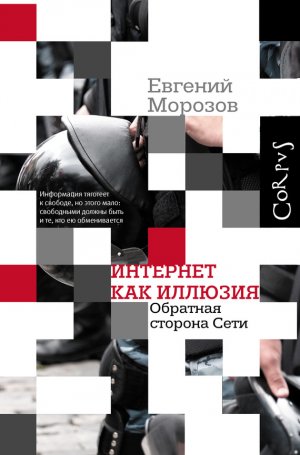Интернет как иллюзия. Обратная сторона сети Морозов Евгений

Hearn, K., and B. Shoesmith Exploring the Roles of Elites in Managing the Chinese Internet // Javnost – The Public, Vol 11 (2004) 101–114.
Hille, Kathrin The Net Closes // Financial Times, July 18, 2009. Hoover, D., and D. Kowalewski Dynamic Models of Dissent and Repression // Journal of Conflict Resolution 36, no. 1 (1992): 150–182.
Huang, Haifeng Media Freedom, Governance, and Regime Stabi-lity in Authoritarian States. Unpublished Paper, 2008.
Huntington, Samuel P. The Third Wave: Democratization In the Late Twentieth Century. Norman: University of Oklahoma Press, 1993.
Jiang, M., and H. Xu Exploring Online Structures on Chinese Go-vernment Portals: Citizen Political Participation and Government Legitimation // Social Science Computer Review 27, no. 2 (2009): 174–195.
Johnson, Erica, and Beth Kolko E-Government and Trans-parency in Authoritarian Regimes: Comparison of National– and City-Level E-Government Websites in Central Asia. Presented at the Annual Meeting of the International Studies Association, 2010.
Johnston, H., and C. Mueller Unobtrusive Practices of Con-tention in Leninist Regimes // Sociological Perspectives 44, no. 3 (2001): 351–375.
Kaplan, Jeremy A. China Expanding Censorship to Text Messages // FOX News.com, January 20, 2010. www.foxnews.com/scitech/ 2010/01/20/china-expanding-censorship-text-messages/.
Kapstein, E. B., and N. Converse Why Democracies Fail // Journal of Democracy 19, no. 4 (2008): 57–68.
Kaufman, Stephen Bloggers in Mauritania Form a Union // America.gov, August 8, 2008. www.america.gov/st/democracy-english/2008/April/20080408172637liameruoy0.9660608.html.
Kennedy, J. J. Maintaining Popular Support for the Chinese Com-munist Party: The Influence of Education and the State-Controlled Media // Political Studies 57, no. 3 (2009): 517–536.
Kluver, R. The Architecture of Control: A Chinese Strategy for E-Go-vernance // Journal of Public Policy 25, no. 1 (2005): 75–97.
Kluver, R. US and Chinese Policy Expectations of the Internet // Chi-na Information 19, no. 2 (2005): 299.
Kluver, R., and C. Yang The Internet in China: A Meta-Review of
Research // Information Society 21, no. 4 (2005): 301–308. Kramer, Andrew E., and Jenna Wortham Professor Main
Target of Assault on Twitter // New York Times, August 7, 2009. Kristof, Nicholas D. Death by a Thousand Blogs // New York
Times, May 24, 2005.
Lacharite, J. Electronic Decentralisation in China: A Critical Analysis of Internet Filtering Policies in the People’s Republic of China // Australian Journal of Political Science 37, no. 2 (2002): 333–346.
Lagerkvist, J. The Techno-Cadre’s Dream: Administrative Reform by Electronic Governance in China Today? // China Information 19, no. 2 (2005): 189.
Latham, K. SMS, Communication, and Citizenship in China’s Information Society // Critical Asian Studies 39, no. 2 (2007): 295–314.
Levitsky, S., and L. A. Way The Rise of Competitive Authoritari-anism // Journal of Democracy 13, no. 2 (2002): 51–65.
Levy, Clifford J. Videos Rouse Russian Anger Toward Police // New York Times, July 27, 2010.
Li, S. The Online Public Space and Popular Ethos in China // Media, Culture & Society 32, no. 1 (2010): 63.
MacKinnon, R. Flatter World and Thicker Walls? Blogs, Censorship and Civic Discourse in China // Public Choice 134, no. 1 (2008): 31–46.
MacKinnon, R. Liberty or Safety? Both – or Neither // IEEE Spec-trum, May 2010.
Magaloni, B., and J. Wallace Citizen Loyalty, Mass Protest and Authoritarian Survival. Presented at the Conference on Dictator-ships: Their Governance and Social Consequences, Princeton Uni-versity, April 2008.
Markoff, J. Iranians and Others Outwit Net Censors // New York Times, April 30, 2009.
Medvedev Looks to Singapore for Electronic Efficiency // Reuters, No-vember 11, 2009.
Meng, B. Moving Beyond Democratization: A Thought Piece on the China Internet Research Agenda // International Journal of Com-munication 4 (2010): 501–508.
Miradova, M. Azerbaijan: Webcams Used for “Transparent” Munici-pal Elections // EurasiaNet.org, December 22, 2009.
Moore, M. China’s Internet Porn Reward Drives Rise in Online Erot-ica Searches // Daily Telegraph, December 7, 2009.
O’Brien, K. J. How Authoritarian Rule Works // Modern China 36, no. 1 (2010): 79–86.
Our Chip Has Come In // New Republic 200, no. 24 (1989): 7–8. Pickel, A. Authoritarianism or Democracy? Marketization as a Politi-cal Problem // Policy Sciences 26, no. 3 (1993): 139–163.
Press Conference with Secretary Gates and Adm. Mullen. Transcript.
U. S. Department of Defense, June 18, 2009.
Ramstad, E. Gulags, Nukes and a Water Slide: Citizen Spies Lift
North Korea’s Veil // Wall Street Journal, May 22, 2009. Roberts, H. China Bans the Letter “F” // Watching Technology, June 12,
2009. blogs.law.harvard.edu/hroberts/2009/06/12/china-bans-the-letter-f/.
Rodan, G. The Internet and Political Control in Singapore // Political Science Quarterly 113, no. 1 (1998): 63–89.
Rosen, S. Is the Internet a Positive Force in the Development of Civil Society, a Public Sphere, and Democratization in China? // International Journal of Communication 4 (2010): 509–516.
Rothstein, B. Creating Political Legitimacy: Electoral Democracy Versus Quality of Government // American Behavioral Scientist 53, no. 3 (2009): 311.
Rubin, M. The Telegraph, Espionage, and Cryptology in Nineteenth Century Iran // Cryptologia 25, no. 1 (2001): 18–36.
Russian Opposition Newspaper Comes Under Hacker Attack // Agence France-Presse, January 26, 2010.
Satarov, G. Don’t Expect Miracles From Russia’s “Authoritarian Mo-dernization” // Radio Free Europe / Radio Liberty, February 21, 2010.
Saudi Religious Police Launch Facebook Group // Al Arabiya, Novem-ber 8, 2009.
Saunders, R. Wiring the Second World: The Geopolitics of Information and Communications Technology in Post-Totalitarian Eurasia // Russian Cyberspace Journal 1 (2009).
Schucher, G. Liberalization in Times of Instability: Margins of Un-conventional Participation in Chinese Authoritarianism // Social Science Research Network Working Paper Series, December 5, 2009.
Schuppan, T. E-Government in Developing Countries: Experiences from Sub-Saharan Africa // Government Information Quarter-ly 26, no. 1 (2009): 118–127.
Seligson, A. L., and J. A. Tucker Feeding the Hand That Bit You: Voting for Ex-Authoritarian Rulers in Russia and Bolivia // Demokratizatsiya: The Journal of Post-Soviet Democratization 13, no. 1 (2005): 11–44.
Shepherd, T. Twittering in the OECD’s “Participative Web”: Micro-blogging and New Media Policy // Global Media Journal 2, no. 1 (2009): 149–165.
Shilton, K. Four Billion Little Brothers? Privacy, Mobile Phones, and Ubiquitous Data Collection // Communications of the ACM 52, no. 11 (2009): 48–53.
Shultz, G. P. New Realities and New Ways of Thinking // Foreign Affairs 63, no. 4 (1985): 705–721.
Siegel, D. A. Social Networks and Collective Action // American Journal of Political Science 53, no. 1 (2009): 122–138.
Sola Pool, Ithiel de Communication in Totalitarian Societies / In: Handbook of Communication, ed. by Sola Pool, Ithiel de, Schramm, W., Maccoby, N., and E. Parker, 463–474. Chicago: Rand McNally, 1973.
Thai Website to Protect the King // BBC News, February 5, 2009. Thornton, P. M. Censorship and Surveillance in Chinese Cyber-space: Beyond the Great Firewall / In: Chinese Politics: State, Society and the Market, ed. by Gries, P. H., and S. Rosen, 179–198. New York: Routledge, 2010.
Thussu, D. K. News as Entertainment: The Rise of Global Infotainment. Thousand Oaks, CA: Sage, 2007.
Toffler, A. The Third Wave. New York: Bantam Books, 1981. Union, S., and H. Steve Deliberative Institutions as Mechanisms for Managing Social Unrest: The Case of the 2008 Chongqing Taxi Strike // China: An International Journal 7 (2009): 336–352.
Wang, X. Mutual Empowerment of State and Society: Its Nature, Con-ditions, Mechanisms, and Limits // Comparative Politics 31, no. 2 (1999): 231–249.
Warschauer, M. Singapore’s Dilemma: Control Versus Autonomy in
IT-Led Development // Information Society 17, no. 4 (2001): 305–311. Webster, G. Writing “Bass Ackwards” to Defeat Censorship in China//
Sinobyte: China and Technology, CNET News, July 2, 2008. news. cnet.com/830113908_3-9982672-59.html.
Weiss, C. Science, Technology and International Relations // Techno-logy in Society 27, no. 3 (2005): 295–313.
Wohlstetter, A. The Fax Shall Make You Free. Address to Presi-dent Havel’s Peaceful Road to Democracy Conference, Prague, July 4–6, 1990. profiles.nlm.nih.gov/BB/A/R/X/K/_/bbarxk.ocr.
Wong, A. More Government Bodies Listen to Views Online // Today (Singapore), November 4, 2009.
Wriston, W. B. Bits, Bytes, and Diplomacy // Foreign Affairs 76, no. 5 (1997): 172–182.
Андреев Леха Константин Рыков: “Нет никакой политической ангажированности” // Вебпланета, 2 декабря 2008 года. www. webplanet.ru/interview/business/2008/12/02/rykov.html.
Белобородова О. Вместо среднего класса возникли новые сердитые // Взгляд, 1 июля 2010 года. www.vz.ru/politics/2010/7/1/415114. html.
Блогеры ЖЖ начали продавать и покупать популярность // Веб-планета, 9 ноября 2006 года. webplanet.ru/news/life/2006/ 11/09/rykov.html.
Будагарин М. Медведеву и Обаме не нужны Первый канал и Си-эн-эн // Взгляд, 12 января 2010 года. www.vz.ru/politics/ 2010/1/12/364498.html.
В Ленобласти стартовал конкурс блогеров “Местный блог-2009” //
Regions.ru, 6 августа 2009 года. www.regions.ru/news/2231453/.
В Махачкале откроется школа блогеров // РИА Дагестан, 19 февраля 2010 года. www.riadagestan.ru/news/2010/02/19/92692/.
Госдума поддержала компьютерный патриотизм // BFM.ru, 15 февраля 2010 года. www.bfm.ru/articles/2010/02/15/gosduma-predl-agaet-igrat-s-patriotizmom.html.
Единоросс Рыков запустил онлайн-ТВ // Вебпланета, 10 октяб ря
2007 года. webplanet.ru/news/life/2007/10/10/rykov_edrussia.html. Интервью: Мария Сергеева // Moscow News, 5 марта 2009 года. Интернет раздвинул границы времени // Дни. ру, 21 апреля
2009 года. www.dni.ru/tech/2009/4/21/164475.html. Нагорных И., Беспалова Н. “Единая Россия” предложит видеосервис // Коммерсант, 21 августа 2008 года. www.kommer-sant.ru/doc.aspx?DocsID=1013903.
Прямая речь // Коммерсант, 16 ноября 2006 года. www.kommersant. ru/doc.aspx?DocsID=720472.
Торговля “идеологической картошкой” // ОПРФ, 26 мая 2009 года. www. oprf.ru/newsblock/news/2468/chamber_news?returnto=0&n=1.
Якеменко Б. Церковь должна бороться за молодежь в интернете // Regions.ru, 5 февраля 2009 года. www.regions.ru/news/lo-cation01824/ 2194524/.
Akhvlediani, M. The Fatal Flaw: The Media and the Russian Invasion of Georgia // Small Wars & Insurgencies 20, no. 2 (2009): 363–390.
Amir-Ebrahimi, M. Blogging from Qom, Behind Walls and Veils // Comparative Studies of South Asia, Africa and the Middle East 28, no. 2 (2008): 235.
Bandurski, David China’s Guerrilla War for the Web // Far Eastern Economic Review, July 2008.
Barry, Ellen War on a Cultural Battlefield: On Anniversary of Fight over South Ossetia, Rage Is Still Raw in the Region // International Herald Tribune, August 8, 2009.
Boudreaux, Richard Bucks Populi: Making Democracy a Going
Concern in Kiev // Wall Street Journal, February 5, 2010. Brady, Anne-Marie Marketing Dictatorship: Propaganda and
Thought Work in Contemporary China. Lanham, MD: Rowman & Littlefield, 2008.
Brady, Anne-Marie Mass Persuasion as a Means of Legitimation and China’s Popular Authoritarianism // American Behavioral Sci-entist 53, no. 3 (2009): 434.
Brady, Anne-Marie Regimenting the Public Mind: The Modernization of Propaganda in the PRC // International Journal 57 (2001): 563.
Brady, Anne-Marie The Beijing Olympics as a Campaign of Mass Distraction // China Quarterly 197 (2009): 1–24.
Brady, Anne-Marie Treat Insiders and Outsiders Differently: The Use and Control of Foreigners in the PRC // China Quarterly 164 (2009): 943–964.
Cairncross, Frances The Death of Distance: How the Communications Revolution Will Change Our Lives. Cambridge, MA: Harvard Business Press, 1997.
Cancel, Daniel Chvez Adds iPod to Portfolio After Embracing BlackBerry, Twitter Account // Bloomberg News, July 21, 2010. Cancel, Daniel Chvez Says Twitter, Blackberry Are “Secret Wea-pon” // Business Week, April 29, 2010.
Cancel, Daniel Chvez to Join Obama, Castro in Adding Twitter to Media Arsenal // Business Week, April 26, 2010.
Chvez Beefs Up Twitter Moves with State Funds, Staff // Agence France-Presse, November 5, 2010.
China’s Internet “Spin Doctors” // BBC News, December 16, 2008. Chinea, Eyanir Venezuela’s Chatty Leader Chvez Joins Twitter //
Reuters, April 27, 2010.
Crovitz, Gordon L. China’s Web Crackdown Continues // Wall Street Journal, January 10, 2010.
Diaz, Marianne President Chvez and His “Communicational Guerrilla” // Global Voices Advocacy, April 16, 2010. advocacy. globalvoicesonline.org/2010/04/16/president-chavez-and-his-communicational-guerrilla/.
Ding, S. Informing the Masses and Heeding Public Opinion: China’s New Internet-Related Policy Initiatives to Deal with Its Gover-nance Crisis // Journal of Information Technology & Politics 6, no. 1 (2009): 31–42.
Eadie, William F. Twenty-First Century Communication: A Refe-rence Handbook. Vol. 1. Thousand Oaks, CA: Sage, 2009.
Ernkvist, M., and P. Strom Enmeshed in Games with the Government: Governmental Policies and the Development of the Chinese Online Game Industry // Games and Culture 3, no. 1 (2008): 98.
Esfandiari, Golnaz Iranian Social Networking, Hard-Line Style // Radio Free Europe/Radio Liberty, July 29, 2010.
Fareed, M. China Joins a Turf War // Guardian, September 22,2008.
Fossato, F. Web Captives // Index on Censorship 38, no. 3 (2009): 132. Fowler, G. A., and J. Ye Chinese Bloggers Scale the “Great Fire-wall” in Riot’s Aftermath // Wall Street Journal, July 2, 2008.
Franchetti, M. Maria Sergeyeva: Putin’s Rising Star // Sunday Times, March 8, 2009.
French, H. W. As Chinese Students Go Online, Little Sister Is Watching // New York Times, May 9, 2006.
Fu, R. China’s Anti-Blogging Strategy: Tell the Truth, and Fast // China Internet Watch, July 30, 2009. www.chinainternetwatch.com/193/ china%E2%80%99s-anti-blogging-strategy-tell-the-truth-and-fast/.
Geddes, B., and J. Zaller Sources of Popular Support for Authori-tarian Regimes // American Journal of Political Science 33, no. 2 (1989): 319–347.
Goodin, Dan Security Boss Calls for End to Net Anonymity // Register, October 16, 2009. www.theregister.co.uk/2009/10/16/kaspersky _rebukes_ net_anonymity/.
Gribanov, A., and M. Kowell Samizdat According to Andropov // Poetics Today 30, no. 1 (2009): 89.
Hassan, Amro Egypt: Gamal Mubarak Turns to the Web // Los Angeles Times, August 13, 2009.
He, Z. SMS in China: A Major Carrier of the Nonofficial Discourse
Universe // Information Society 24, no. 3 (2008): 182–190. Hearn, K., and A. Willis Lei Feng Lives On in Cyberspace / In:
Proceedings of the 3rd International Conference on Digital Interac-tive Media in Entertainment and Arts, 248–255. ACM International Conference Proceeding Series, vol. 349. 2008.
Hille, Kathrin Internet Anger Forces Jail Death U-Turn // Finan-cial Times, February 28, 2009.
Hille, Kathrin The Net Closes // Financial Times, July 18, 2009. Hodge, Nathan Kremlin Launches “School of Bloggers” // Danger
Room, Wired, May 27, 2009. www.wired.com/dangerroom/2009/ 05/kremlin-launches-school-of-bloggers/.
Iran’s Bloggers Thrive Despite Blocks // BBC News, December 15, 2008.
Jacobs, Andrew China’s Answer to a Crime Includes Amateur Sleuths // New York Times, February 24, 2009.
Jung, Sung-ki Russian Experts Arrive to Review Cheonan Findings // Korea Times, May 31, 2010.
Keohane, Joe How Facts Backfire // Boston Globe, July 11, 2010.
Kim, Tae-gyu “Sleeper Effect” Causes People to Be Swayed by Rumors // Korea Times, June 2, 2010.
Kshetri, N. The Evolution of the Chinese Online Gaming Industry //
Journal of Technology Management in China 4, no. 2 (2009): 158–179. LaFraniere, Sharon China Adds a Feature to Phones: Patriotism //
New York Times, September 30, 2009.
Landsberger, S. R. Learning by What Example? Educational Propa-ganda in Twenty-First-Century China // Critical Asian Studies 33, no. 4 (2001): 541–571.
Latynina, Y. Why Putin Isn’t Afraid of a Free Internet // Moscow Times, March 24, 2010.
Lee, C. C., He, Z., and Y. Huang Chinese Party Publicity Inc. Conglomerated: The Case of the Shenzhen Press Group // Media, Culture & Society 28, no. 4 (2006): 581.
Levine, Yasha Blogger Gorshkov Will Dish Dirt on Russian Politi-cians // Wired, August 16, 2010.
Li, Datong China’s Leaders, the Media and the Internet // Open-Democracy, July 8, 2008. www.opendemocracy.net/article/china-s-leaders-and-the-internet.
Lin, Miguel Vzquez History as a Propaganda Tool in Putin’s Russia // Communist and Post-Communist Studies 43, no. 2 (June 2010): 167–178.
Lin, Miguel Vzquez Putin’s Propaganda Legacy // Post-Soviet Affairs 25, no. 2 (2009): 137–159.
Lollar, X. L. Assessing China’s E-Government: Information, Ser-vice, Transparency and Citizen Outreach of Government Websites // Journal of Contemporary China 15, no. 46 (2006): 31–41.
Lu, J., and I. Weber State, Power and Mobile Communication:
A Case Study of China // New Media & Society 9, no. 6 (2007): 925. Mallpas, A. The Bombastic Blonde of the Blogosphere // Moscow
Times, February 13, 2009.
Millan, M. USocial CEO: “We’re Gaming Digg” // Technology Blog, Los Angeles Times, March 5, 2009. latimesblogs.latimes.com/ technology/2009/03/usocial-digg.html.
Molinski, D. Venezuelan President’s First Tweets Lure 204,000 Fol-lowers // Speakeasy Blog, Wall Street Journal, May 5, 2010. blogs. wsj.com/speakeasy/2010/05/05/hugo-chavez-joins-twitter-asks-whats-up/.
Nathan, A. Medals and Rights // New Republic, July 9, 2008.
Noelle-Neumann, E. The Spiral of Silence: Public Opinion, Our
Social Skin. Chicago: University of Chicago Press, 1993. Novruzov, A. S. Facebook and Plans of the Party / In: Mutatione
Fortitudo Blog, June 5, 2010. blog.novruzov.az/2010/06/facebook-and-plans-of-party.html.
Olshansky, E. A “Russian Sarah Palin”? Meet Pro-Putin Activist Maria Sergeyeva, Russia’s Rising Political Star // New York Daily
News, March 9, 2009.
Osipovich, A. Noize MC, aka Ivan Alexeyev, and Russian Rap In-spire a Movement // Wall Street Journal, July 24, 2010.
Page, Lewis NSA Offering “Billions” for Skype Eavesdrop Solution // Register, February 12, 2009. www.theregister.co.uk/2009/02/12/ nsa_offers_billions_for_skype_pwnage/.
Podger, Corinne China Marshalls Army of Bloggers // Connect Asia. Radio Australia, August 21, 2008.
Pretel, Enrique Andres Twitter’s Heady Rise Has Venezuela’s Hugo Chvez in Spin // Reuters, March 30, 2010.
Ramzy, Austin In China, Suspicious Jail Deaths on the Rise // Time, March 7, 2008.
Rogers, Paul Streisand’s Home Becomes Hit on Web // Mercury News, June 24, 2003.
Romero, Simon Building a New History By Exhuming Bolvar // New York Times, August 3, 2010.
Shaer, Matthew From the Tumult in Iran, Twitter Emerges as a
Powerful Social Tool // Christian Science Monitor, June 17, 2009. Shambaugh, D. China’s Propaganda System: Institutions, Processes and Efficacy // China Journal 57 (January 2007): 25.
Si-Soo, Park Police Hunt for Cheonan Rumors // Korea Times, June 1, 2010.
Soldatov, A. Kremlin.com // Index on Censorship 39, no. 1 (2010): 71. Solove, Daniel J. Understanding Privacy. Cambridge, MA: Harvard
University Press, 2008.
Stewart, Will Putin’s Poster Girl: Pin-up Politician Who Hates the
West… but Loves Thatcher // Daily Mail, March 15, 2009. Sunstein, C. R., and A. Vermeule Conspiracy Theories: Causes and Cures // Journal of Political Philosophy 17, no. 2 (2009): 202–227.
Tamayo, Juan Cuba Fighting Blogs with Blogs // Miami Herald, De-cember 13, 2009.
Taylor, D. G. Pluralistic Ignorance and the Spiral of Silence: A Formal Analysis // Public Opinion Quarterly 46, no. 3 (1982): 311.
Texting in China: Well-red // The Economist, February 18, 2010. Troianovski, Anton, and Peter Finn Kremlin Seeks to Ex-tend Its Reach in Cyberspace // Washington Post, October 28, 2007.
Umaru Yar’adua Regime Launches $ 5 Million Online War // Sahara Re-porters, June 16, 2009. saharareporters.com.
Vietnam to Tighten Control over Online Games // Vietnam News Briefs, April 15, 2010.
Volkova, Marina Church to Enhance Its Influence Through Blog-ging // Voice of Russia, July 19, 2010. english.ruvr.ru/2010/07/ 19/12756896.html.
Von Twickel, Nikolaus Putin Calls Hip-Hop a Cure for Booze, Drugs // Moscow Times, November 16, 2009.
Walker, Christopher Repressing the Media // Miami Herald, April 30, 2010.
Wang, Z. Explaining Regime Strength in China // China: An International Journal 4, no. 2 (2006): 217–237.
Watts, Jonathan Old Suspicions Magnified Mistrust ito Ethnic Ri-ots in Urumqi // Guardian, July 10, 2009.
Wong, E. Vice President Turns to Speech Editing // New York Times, May 13, 2010.
Wu, Zhong China’s Internet Awash with State Spies // Asia Times On-line, August 14, 2008. www.atimes.com/atimes/China/JH14Ad01. html.
Ye, J. “Hidden Cat”: A Prisoner’s Death Gives New Meaning to Chil-dren’s Game // China Real Time Report Blog, Wall Street Jour-nal, February 18, 2009. blogs.wsj.com/chinarealtime/2009/02/18/ hidden-cat-a-prisoners-death-gives-new-meaning-to-childrens-game/.
Yiannopoulos, M. What is “The Streisand Effect”? // Milo Yian-nopoulos Blog, Daily Telegraph, January 31, 2009. blogs.telegraph. co.uk/technology/miloyiannopoulos/8248311/What_is_The_ Streisand_Effect/.
Zhang, J. Will the Government “Serve the People”? The Development of
Chinese E-Government // New Media & Society 4, no. 2 (2002): 163. Zhou, Yu The Inside Story of China’s High-Tech Industry: Making Sil-icon Valley in Beijing. Lanham, MD: Rowman & Littlefield, 2008.
Андрианов К., Козенко А. “Мемориал” повернул обыск вспять // Коммерсант, 21 марта 2009 года. www.kommersant.ru/doc.aspx? DocsID=1142280.
Блогеры сообщают, что ФСБ просит удалять посты на тему акций протеста // Рамблер-Новости, 24 декабря 2008 года. news. rambler.ru/Russia/head/1634066/?abstroff=0.
Даутин А. Чем больше оппозиционеров, тем хуже связь? // Белорусские новости, 29 марта 2006 года. naviny.by/rubrics/mo-bile/2006/03/29/ic_articles_127_133799/.
Кондратьев А., Подрез Т. Минкомсвязи выделит 10 млн руб. на e-mail адреса на кириллице // Маркер, 4 июня 2010 года. www. marker.ru/news/891.
Московская милиция мониторит “Твиттер” // Вебпланета, 10 ноября 2009 года. webplanet.ru/news/life/2009/11/10/iopasnaitrud-na.html.
Плющев, Александр Поисковые системы как стратегический и политический ресурс // Эхо Москвы, 24 января 2010 года. echo.msk.ru/programs/tochka/651123-echo/.
Панкавец, Зміцер КДБ вербуе праз vkontakte.ru // Наша нiва, 19 декабря 2009 года. http://nn.by/?c=ar&i=23079.
Armstrong Moore, E. Google Flu Trends: Take with Grain of Salt // CNET News, May 17, 2010. news.cnet.com/8301-27083_3-20005150-247.html.
Azerbaijani Authorities Interrogate Music Fan over Eurovision Vote for Armenia // Radio Free Europe/Radio Liberty, August 14, 2009.
Balduzzi, M., et al. Abusing Social Networks for Automated User
Profiling // International Secure Systems Lab (March 2010). Bannon, L. J. Forgetting as a Feature, not a Bug: The Duality of Me-mory and Implications for Ubiquitous Computing // CoDesign 2, no. 1 (2006): 3–15.
Bennett, C. J., and C. D. Raab The Governance of Privacy: Policy Instruments in Global Perspective. Farnham, UK: Ashgate, 2003.
Bilton, N. An Average American Consumes 34 Gigabytes a Day, Study Says // New York Times, December 9, 2009.
Blanchette, J. F., and D. G. Johnson Data Retention and the Panoptic Society: The Social Benefits of Forgetfulness // Information Society 18, no. 1 (2002): 33–45.
Bonneau, J., Anderson, J., Anderson, R., and F. Stajano Eight Friends Are Enough: Social Graph Approximation via Public Listings / In: Proceedings of the Second ACM EuroSys Workshop on Social Network Systems, 13–18. 2009.
Bunyan, T. Just over the Horizon: The Surveillance Society and the State in the EU // Race & Class 51, no. 3 (2010): 1.
Cambodia Shuts Off SMS Ahead of Elections // Associated Press, April 2, 2007.
Carver, G. A., Jr. Intelligence in the Age of Glasnost // Foreign Af-fairs 69 (1989): 147.
Clover, C. Stalin-Era Files Raided in “War over Memory” // Finan-cial Times, December 7, 2008.
Cohen, J. Children of Jihad: A Young American’s Travels Among the Youth of the Middle East. New York: Gotham, 2007.
Dementis, G., and G. Sousa A Legal Reasoning Component of a Network Security Command and Control System. Master’s thesis, Naval Postgraduate School, Monterey, CA, 2010.
Dodge, M., and R. Kitchin The Ethics of Forgetting in an Age of
Pervasive Computing // CASA Working Papers 92 (2005). Elliott, C. Hotels Connecting Dots to Online Reviewers // Tribune
Media Services, June 4, 2010.
Faris, R., Roberts, H, and S. Wang China’s Green Dam: The Implications of Government Control Encroaching on the Home PC // OpenNet Initiative, June 2009. opennet.net/chinas-green-dam-the-implications-government-control-encroaching-home-pc.
Fassihi, F. Iranian Crackdown Goes Global // Wall Street Journal, December 3, 2009.






